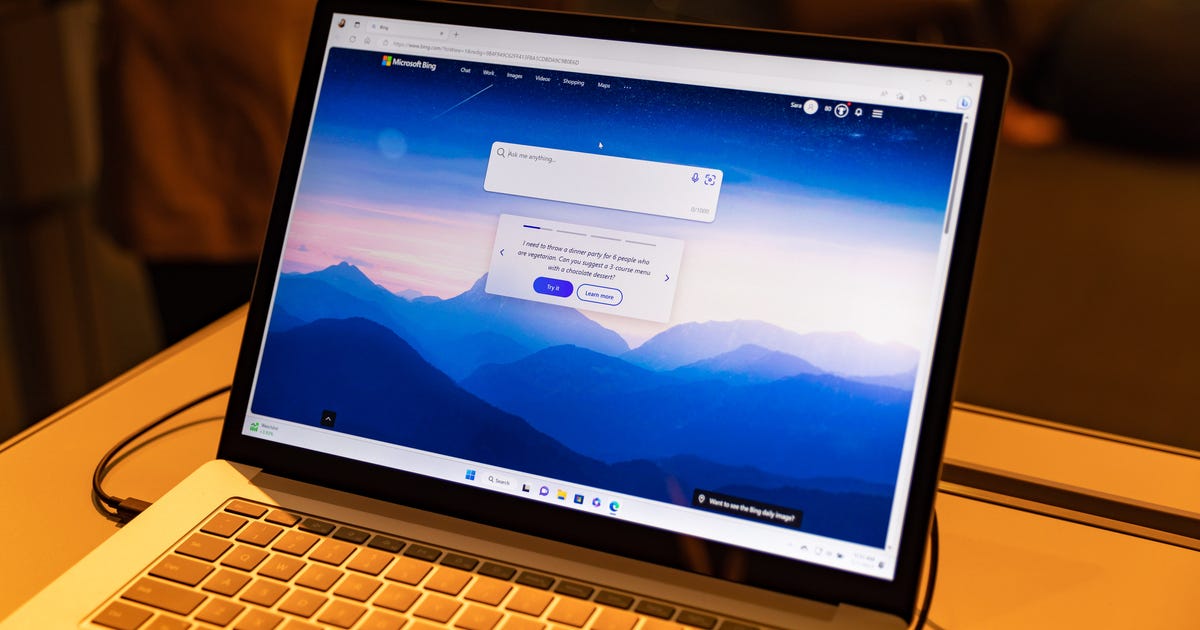
Microsoft on Tuesday announced an enhanced Bing, detailing how it’s using the AI tech behind ChatGPT to add in a slew of new capabilities to the longtime second-place search engine. There’s a waiting list for the service now, and Microsoft says it will be available broadly in the coming months. There’ll be no charge for the service.
CEO Satya Nadella said the juiced-up search service aims to take on queries that aren’t getting good results on today’s search engines. People increasingly use search engines to get advice and information on complex topics, not just a link to a website, and the AI boost to Bing aims to make it more usable.
“It’s a new day in search,” Nadella said during the event on Tuesday.
ChatGPT, an AI-powered chatbot from a company called OpenAI, burst onto the scene in November with a breathtaking capacity for drawing information from the web and presenting it in plausible essays, poems and other formats. It set off an intense interest in AI that has captured the attention of millions, including the Big Tech players. Last month, Microsoft said it would be investing billions of dollars into the company. On Monday, Google, the dominant search engine on the web, announced Bard, its ChatGPT challenger.
Microsoft says its technology makes Bing your co-pilot on the web. Here’s a taste of what you can try out with the AI-powered search.
Search
You can search on Bing.com, as always. What’s new here is that Microsoft has applied OpenAI’s model to its search ranking engine. That led to a huge leap in the relevance of search results, the company says, so Microsoft believes you’ll find better responses to your basic searches on Bing.
The AI also augments the search results with written summaries. A use case Microsoft predicts will be popular is planning a trip. If you’re going to New Orleans for three days, for example, what should you do? A search on Bing will show you not just links to sites with sight-seeing and museum suggestions for the Big Easy, but also a sidebar with a summary of information from around the web, written by AI. The sidebar will link to sources that can let you explore further.
Ask for more details
If you want to ask more questions after your initial Bing search, you can click the chat icon near the top of the search page. Here you can refine the results. In the trip planning example, you can do things like clarify that you’re visiting New Orleans with kids, or ask for a three-day itinerary for your visit.
Bing can offer pretty fine-grained results in this conversational format. In addition to a detailed itinerary with descriptions of the places you’ll visit, you can ask for travel times between activities in New Orleans, for example.
This also applies to searching for advice on a home improvement project, like installing air conditioning in your house. If you clarify that you have air ducts in your home already, for example, it can give you information more relevant to your project.
Write something
The new Bing can write for you. After you research your home improvement project, for example, you ask Bing to write an email to your partner summarizing what you found. You can edit the writing, click into the text box of a new email and have Bing insert it there.
You can also ask Bing to write something with a fresh prompt, similar to many examples of ChatGPT’s writing that users have shared online recently. Anything from the whimsical “write a story about a curious dog who goes to the moon for preschoolers” to the more serious “write a letter to my apartment contesting an upcoming increase in rent” can generate text. You can also tweak the tone of the writing, like requesting it be funny.
Get context for a website
On the newly revamped Edge browser, you’ll be able to open a Bing sidebar and get more information about something you’re looking at online. You can open a product listing on Amazon, for example, and then open up the sidebar to ask Bing to tell you about the product. It’ll give you a summary of the product’s specs, cost and use cases.
For a specific iRobot vacuum, for example, you can also ask Bing for examples of reviews from cat owners. That’ll pull up quotes from Amazon reviews for the vacuum that mention cats and some summary from Bing.
You can also ask Bing to give you the key takeaways from a long document, and then compare it to another document.
Ask a broad question
If you’ve ever typed a query like “who are some famous Mexican painters?” into a search engine, you’re probably familiar with the experience of getting an excerpt from one website, a list of relevant people and a link to Wikipedia. The request is so broad that you typically have to leave the search page to get the answer. The new Bing wants you to stay, at least for a while.
Ask about Mexican painters on the new Bing and you’ll get a written summary of the key players and a description of their work. You can click on links to sources to learn more, if you like, or you can ask for more fine-grained results in the chat function.
Editors’ note: CNET is using an AI engine to create some personal finance explainers that are edited and fact-checked by our editors. For more, see this post.
